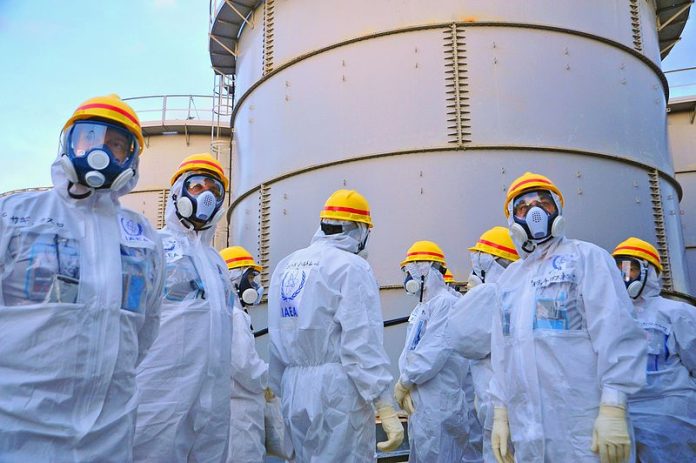International Atomic Energy Agency (IAEA) has confirmed that the tritium level in the fourth batch of diluted treated air, which Tokyo Electric Power Company (TEPCO) started discharging on 28 February 2024, is far below the Japan’s operational limit.
Experts stationed at the site of the Fukushima nuklear kuasa station (FDNPS) took samples after the treated air was diluted with air laut in the discharge facilities on 28 February. The analysis confirmed that the tritium concentration is far below the operational limit of 1,500 becquerels per litre.
Japan is discharging the treated air from the FDNPS in batches. The previous three batches – a total of 23,400 cubic metres of air – were also confirmed by the IAEA to have contained tritium concentrations far below operational limits.
Since the accident in 2011, air is needed to continually cool the melted fuel and fuel debris at the Fukushima Daiichi NPS. In addition to the air pumped in for this purpose, groundwater also seeps into the site from the surrounding environment, and rainwater falls into the damaged reactor and turbine buildings. When air comes in contact with melted fuel, fuel debris and other radioactive substances, it becomes contaminated.
The contaminated air is dirawat through a filtration process known as Advanced Liquid Processing System (ALPS) which uses a series of chemical reactions to remove 62 radionuclides from contaminated water before being stored. However, tritium cannot be from the contaminated water through ALPS. Tritium can be recovered when it is highly concentrated in small amounts of water, for example at nuklear fusion facilities. However, the stored water at the Fukushima Daiichi NPS has a low concentration of tritium in a large volume of water and so the existing technologies are not applicable.
Tritium is a naturally occurring radioactive form of hydrogen (half-life 12.32 years) that is produced in the atmosphere when cosmic rays collide with air molecules and has the lowest radiological impact of all naturally occurring radionuclides in seawater. Tritium is also a by-product of operating nuklear power plants to produce electricity. It emits weak beta-particles, i.e., electrons, with an average energy of 5.7 keV (kiloelectron-volts), which can penetrate about 6.0 mm of air but cannot penetrate the body through human skin. It may present a radiation hazard if inhaled or ingested but is only harmful to humans in very large doses.
Currently, contaminated water produced at the Fukushima Daiichi NPS is treated and stored on site in specially prepared tanks. TEPCO, the plant operator, has installed roughly 1000 of these tanks at the Fukushima Daiichi NPS site to hold around 1.3 million cubic meters of the treated water (as of 2 June 2022). Since 2011, the volume of water in storage has increased steadily, and the current tank ruang available to store this water is nearing full capacity.
Walaupun penambahbaikan telah dibuat untuk mengurangkan dengan ketara kadar air tercemar terhasil, TEPCO telah menentukan penyelesaian pelupusan jangka panjang diperlukan untuk membantu memastikan penamatan berterusan tapak. Pada April 2021, Kerajaan Jepun mengeluarkan Dasar Asasnya yang menggariskan arahan untuk melupuskan air yang dirawat ALPS melalui pelepasan terkawal ke laut yang akan dimulakan dalam masa kira-kira 2 tahun, tertakluk kepada kelulusan kawal selia domestik.
On 11 March 2011, Japan was shaken by the Great East Japan (Tohoku) Gempa bumi. It was followed by a tsunami which resulted in waves reaching heights of more than 10 meters. The gempa bumi and tsunami led to a major accident at the Fukushima Daiichi Nuklear Power Station, which was ultimately categorized as a Level 7 on the International Nuklear and Radiological Event Scale, the same level as the 1986 Chernobyl kemalangan namun akibat kesihatan awam di Fukushima adalah kurang teruk.
***
Sumber:
- IAEA. Siaran akhbar – Tahap tritium jauh di bawah had operasi Jepun dalam kumpulan keempat air terawat ALPS, IAEA mengesahkan. Disiarkan pada 29 Februari 2024. https://www.iaea.org/newscenter/pressreleases/tritium-level-far-below-japans-operational-limit-in-fourth-batch-of-alps-treated-water-iaea-confirms
- IAEA. Pelepasan Air Terawat Fukushima Daiichi ALPS. Sistem Pemprosesan Cecair Lanjutan (ALPS). https://www.iaea.org/topics/response/fukushima-daiichi-nuclear-accident/fukushima-daiichi-alps-treated-water-discharge
- IAEA. Kemalangan Nuklear Fukushima Daiichi https://www.iaea.org/topics/response/fukushima-daiichi-nuclear-accident
***






































